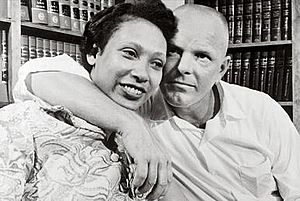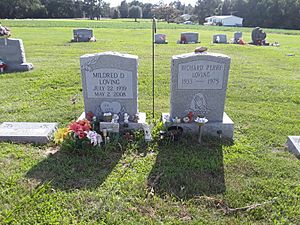Mildred and Richard Loving facts for kids
Quick facts for kids
Mildred and Richard Loving
|
|
|---|---|

Mildred and Richard Loving in 1967
|
|
| Born | Mildred Mildred Delores Jeter July 22, 1939 Central Point, Virginia, U.S. Richard Richard Perry Loving October 29, 1933 Central Point, Virginia, U.S. |
| Died | Mildred May 2, 2008 (aged 68) Milford, Virginia, U.S. Richard June 29, 1975 (aged 41) Caroline County, Virginia, U.S. |
| Occupation | Mildred Housewife Richard Construction worker |
| Known for | Plaintiffs in Loving v. Virginia (1967) |
| Children | 3 |
Mildred Delores Loving (born Mildred Jeter, July 22, 1939 – May 2, 2008) and her husband Richard Perry Loving (October 29, 1933 – June 29, 1975) were an American couple. They became famous for a very important court case called Loving v. Virginia in 1967.
The Lovings faced legal trouble because they were a married couple of different races. At that time, a law in Virginia banned such marriages. To avoid going to jail, they had to leave their home state. They moved to Washington, D.C., but they really wanted to return to their hometown.
With help from the American Civil Liberties Union (ACLU), they went to court to challenge this unfair law. In 1967, the highest court in the U.S., the U.S. Supreme Court, agreed with them. The Court decided that Virginia's law, and all similar state laws banning interracial marriage, were against the U.S. Constitution. This was because these laws violated the Fourteenth Amendment, which promises equal protection and fair treatment under the law for everyone.
After the court's decision, Mildred lived a quiet life. She didn't often give interviews. On the 40th anniversary of the Loving v. Virginia decision, she shared an important message. She said she was proud that her and Richard's case could help support love, commitment, fairness, and family for all people. She believed everyone should have the freedom to marry who they love, no matter their race, age, or sexual orientation. This case has since been used in other court decisions to support the right to same-sex marriage, including the Supreme Court's decision in Obergefell v. Hodges (2015).
Contents
Growing Up and Getting Married
Mildred's Background
Mildred Jeter was born and grew up in a small community called Central Point in Caroline County, Virginia. Her parents were Musial (Byrd) Jeter and Theoliver Jeter.
Mildred considered herself Native American, specifically from the Rappahannock tribe. This tribe is now officially recognized by the U.S. government. She also had some Cherokee, Portuguese, and African-American family history. People often describe her as having both Native American and African-American heritage.
Richard's Background
Richard Loving was also born and raised in Central Point. His parents were Lola (Allen) Loving and Twillie Loving. After finishing school, Richard became a construction worker. He was of European American descent, meaning he was considered white.
Life in Central Point
Even though Caroline County had strict Jim Crow segregation laws in the 20th century, Central Point was different. It had been a community where people of different races lived together since the 1800s. Virginia also had a law called the Racial Integrity Act of 1924. This law forced everyone to be classified as "white" or "colored." It ignored how many people, including several tribes in the state, had long identified as Indian.
Richard's father worked for a wealthy Black man in the county for 25 years. Richard's closest friends were Black, including the people he raced cars with and Mildred's older brothers. Richard once said that everyone in their community, both white and "colored," helped each other. He explained that they all grew up together and stayed that way.
How Mildred and Richard Met
Mildred and Richard first met when she was 11 and he was 17. Richard was a friend of Mildred's brothers. Years later, when Mildred was in high school, they started dating. When Mildred was 18, she became pregnant. Richard then moved into the Jeter family home. They decided to get married in June 1958 and traveled to Washington, D.C., to do so.
At that time, Virginia had a law called the Racial Integrity Act of 1924 that banned marriage between people of different races. Mildred later said she didn't know their marriage was illegal in Virginia when they got married. However, she thought Richard might have known.
After their wedding, the Lovings returned home to Central Point. One night, the county sheriff arrested them. Someone had told the sheriff about their marriage. They were charged with living together as husband and wife, which was against Virginia's laws. They admitted they were guilty and were convicted on January 6, 1959. They were sentenced to one year in prison. But the judge said they wouldn't have to go to jail if they left the state for 25 years.
So, they moved to Washington, D.C. But they missed their quiet country town. It was hard for them to visit their families in Virginia. They also felt lonely and had money problems in Washington, D.C. In 1964, their youngest son was hit by a car on a busy street. This made them decide they really needed to move back home. So, they started a legal case to get rid of the judgment against them so they could return to Virginia.
The Supreme Court Case
Seeking Legal Help
In 1964, Mildred Loving wrote a letter to the Attorney General Robert F. Kennedy. He was the top lawyer for the U.S. government. Kennedy then connected her with the American Civil Liberties Union (ACLU).
The ACLU took on the Lovings' case. They asked the court to cancel the judgment and sentence against the Lovings. The ACLU argued that Virginia's laws violated the Fourteenth Amendment of the U.S. Constitution. This amendment ensures equal protection and fair treatment under the law for all citizens.
The Legal Journey
This was the start of a series of lawsuits. The case eventually went all the way to the U.S. Supreme Court. On October 28, 1964, since their request hadn't been decided yet, the Lovings started a larger lawsuit. This lawsuit aimed to help not just them, but other people in similar situations.
On January 22, 1965, a lower court allowed the Lovings to present their arguments about the Constitution to the Virginia Supreme Court of Appeals. However, Virginia Supreme Court Justice Harry L. Carrico wrote the court's decision. It said that the laws banning interracial marriage were constitutional and upheld the Lovings' convictions.
The Supreme Court Decision
The Lovings and the ACLU then appealed this decision to the U.S. Supreme Court. The Lovings themselves did not go to Washington for the court arguments. But their lawyer, Bernard S. Cohen, shared a message from Richard Loving with the Court. Richard wanted them to know: "Tell the Court I love my wife, and it is just unfair that I can't live with her in Virginia."
The case, known as Loving v. Virginia, was decided on June 12, 1967. All nine Supreme Court justices agreed with the Lovings. The Court overturned their convictions. Virginia had argued that its law was fair because it applied equally to both white and Black people. But the Supreme Court disagreed. The Court ruled that the law banning interracial marriage violated both the due process and equal protection parts of the Fourteenth Amendment.
After this historic Supreme Court decision, the Lovings were finally able to return to Virginia.
Life After the Court Case
Family Life in Virginia
Mildred and Richard Loving had two children together: Donald Lendberg Loving (born October 8, 1958 – died August 2000) and Peggy Loving (born around 1960). Mildred also had an older son, Sidney Clay Jeter (born January 27, 1957 – died May 2010), before her relationship with Richard. Sidney lived with the Lovings. All of their children grew up, got married, and started their own families. When Mildred passed away, she had eight grandchildren and eleven great-grandchildren.
After the Supreme Court ruled in their favor in 1967, the couple and their children moved back to Central Point, Virginia. Richard built a house for them there. This house became their home for the rest of their lives.
Mildred's Beliefs
Mildred said she believed her marriage and the Supreme Court's decision were "God's work." She strongly supported everyone's right to marry whomever they wished. In 1965, while their case was still ongoing, she told a newspaper, "We loved each other and got married. We are not marrying the state. The law should allow a person to marry anyone he wants."
On June 12, 2007, Mildred released a special statement. This was to mark the 40th anniversary of the Loving v. Virginia Supreme Court decision.
She ended her statement with these powerful words:
My generation was bitterly divided over something that should have been so clear and right. The majority believed that what the judge said, that it was God's plan to keep people apart, and that government should discriminate against people in love. But I have lived long enough now to see big changes. The older generation's fears and prejudices have given way, and today's young people realize that if someone loves someone they have a right to marry.
Surrounded as I am now by wonderful children and grandchildren, not a day goes by that I don't think of Richard and our love, our right to marry, and how much it meant to me to have that freedom to marry the person precious to me, even if others thought he was the "wrong kind of person" for me to marry. I believe all Americans, no matter their race, no matter their sex, no matter their sexual orientation, should have that same freedom to marry. Government has no business imposing some people's religious beliefs over others. Especially if it denies people's civil rights.
I am still not a political person, but I am proud that Richard's and my name is on a court case that can help reinforce the love, the commitment, the fairness, and the family that so many people, black or white, young or old, gay or straight seek in life. I support the freedom to marry for all. That's what Loving, and loving, are all about.
Deaths
On June 29, 1975, a driver hit the Lovings' car in Caroline County, Virginia. Richard died in the crash at the age of 41. Mildred was also hurt and lost her right eye.
Mildred died from pneumonia on May 2, 2008, in Milford, Virginia. She was 68 years old. Her daughter, Peggy Loving Fortune, said that she wanted people to remember her mother as strong, brave, and humble, and someone who believed in love.
In Mildred Loving's obituary in the New York Times, it mentioned her statement for the 40th anniversary of the Loving v. Virginia case. It said that Mildred, a modest homemaker, never thought she had done anything special. She told the Associated Press in a rare interview in 2007, "It wasn't my doing. It was God's work."
Legacy
- Mr. and Mrs. Loving (1996): This was a film starring Lela Rochon, Timothy Hutton, and Ruby Dee. Richard Friedenberg wrote and directed it. It was shown on the Showtime network. Mildred Loving said about the movie, "Not much of it was very true. The only part of it right was I had three children."
- Loving Day: June 12 is now known as Loving Day in the United States. It's an unofficial holiday that celebrates interracial marriages.
- The Loving Story (2011): This was a documentary produced by HBO. It was shown at many film festivals. The film includes rare interviews, photos, and videos from the time the Lovings' case was happening.
- Loving (2016): This film by Jeff Nichols was inspired by The Loving Story. It starred Joel Edgerton as Richard Loving and Ruth Negga as Mildred Loving.
 | Bayard Rustin |
 | Jeannette Carter |
 | Jeremiah A. Brown |


